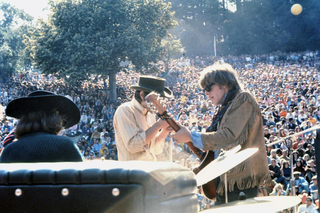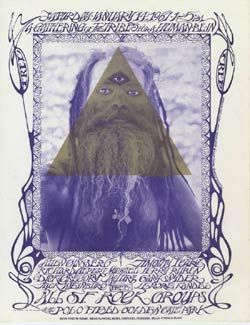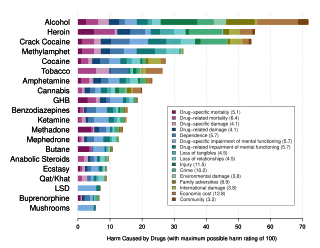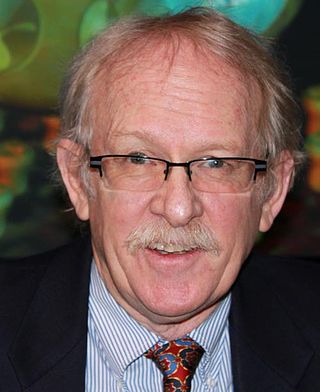
The Summer of Love was a major social phenomenon that occurred in San Francisco during the summer of 1967. As many as 100,000 people, mostly young people, hippies, beatniks, and 1960s counterculture figures, converged in San Francisco's Haight-Ashbury district and Golden Gate Park. More broadly, the Summer of Love encompassed hippie culture, spiritual awakening, hallucinogenic drugs, anti-war sentiment, and free love throughout the West Coast of the United States, and as far away as New York City. An episode of the PBS documentary series American Experience referred to the Summer of Love as "the largest migration of young people in the history of America".

Stimulants are a class of drugs that increase alertness. They are used for various purposes, such as enhancing attention, motivation, cognition, mood, and physical performance. Some stimulants are naturally-occuring while others only occur synthetic. Some of the most common stimulants are caffeine, nicotine, amphetamines, cocaine, methylphenidate, and modafinil. Stimulants may be subject to varying forms of regulation, or outright prohibition, depending on jurisdiction.
The Diggers were a radical community-action group of activists and street theatre actors operating from 1966 to 1968, based in the Haight-Ashbury neighborhood of San Francisco. Their politics have been categorized as "left-wing;" more accurately, they were "community anarchists" who blended a desire for freedom with a consciousness of the community in which they lived. The Diggers' central tenet was to be "authentic," seeking to create a society free from the dictates of money and capitalism.

The Human Be-In was an event held in San Francisco's Golden Gate Park Polo Fields on January 14, 1967. It was a prelude to San Francisco's Summer of Love, which made the Haight-Ashbury district a symbol of American counterculture and introduced the word "psychedelic" to suburbia.

Haight-Ashbury is a district of San Francisco, California, named for the intersection of Haight and Ashbury streets. It is also called the Haight and the Upper Haight. The neighborhood is known as one of the main centers of the counterculture of the 1960s.

Drug rehabilitation is the process of medical or psychotherapeutic treatment for dependency on psychoactive substances such as alcohol, prescription drugs, and street drugs such as cannabis, cocaine, heroin, and amphetamines. The general intent is to enable the patient to confront substance dependence, if present, and stop substance misuse to avoid the psychological, legal, financial, social, and medical consequences that can be caused.
Stimulant psychosis is a mental disorder characterized by psychotic symptoms. It involves and typically occurs following an overdose or several day binge on psychostimulants, although it can occur in the course of stimulant therapy, particularly at higher doses. One study reported occurrences at regularly prescribed doses in approximately 0.1% of individuals within the first several weeks after starting amphetamine or methylphenidate therapy. Methamphetamine psychosis, or long-term effects of stimulant use in the brain, depend upon genetics and may persist for months or years. Psychosis may also result from withdrawal from stimulants, particularly when psychotic symptoms were present during use.
Chester Leo "Chet" Helms, often called the father of San Francisco's 1967 "Summer of Love," was a music promoter and a counterculture figure in San Francisco during its hippie period in the mid- to-late 1960s.
The Lower Haight is a neighborhood, sometimes referred to as Haight–Fillmore, in San Francisco, California.
Substance dependence, also known as drug dependence, is a biopsychological situation whereby an individual's functionality is dependent on the necessitated re-consumption of a psychoactive substance because of an adaptive state that has developed within the individual from psychoactive substance consumption that results in the experience of withdrawal and that necessitates the re-consumption of the drug. A drug addiction, a distinct concept from substance dependence, is defined as compulsive, out-of-control drug use, despite negative consequences. An addictive drug is a drug which is both rewarding and reinforcing. ΔFosB, a gene transcription factor, is now known to be a critical component and common factor in the development of virtually all forms of behavioral and drug addictions, but not dependence.

The Haight Ashbury Free Clinics, Inc. was a free health care service in Northern California which remained in service from June 7, 1967 until July 2019.
John Harvey Frykman was a Lutheran minister and American psychotherapist specializing in brief therapy, medical hypnosis and family therapy. He was the founding director of the drug treatment program of the Haight Ashbury Free Clinic in San Francisco, California, and is noted for his problem solving, individualized approach to substance abuse therapy and solution focused brief therapy.
During the "hippie" period 1967–1968 in San Francisco, an individual named Al Rinker started an organization located at 1830 Fell St in the city's Haight Ashbury district called the Switchboard. Its purpose was to act as a social switchboard for people living there.

A psychoactive drug, mind-altering drug, or consciousness-altering drug is a chemical substance that changes brain function and results in alterations in perception, mood, consciousness, cognition, or behavior. The term psychotropic drug is often used interchangeably, while some sources present narrower definitions. These substances may be used medically; recreationally; to purposefully improve performance or alter consciousness; as entheogens for ritual, spiritual, or shamanic purposes; or for research, including psychedelic therapy. Physicians and other healthcare practitioners prescribe psychoactive drugs from several categories for therapeutic purposes. These include anesthetics, analgesics, anticonvulsant and antiparkinsonian drugs as well as medications used to treat neuropsychiatric disorders, such as antidepressants, anxiolytics, antipsychotics, and stimulants. Some psychoactive substances may be used in detoxification and rehabilitation programs for persons dependent on or addicted to other psychoactive drugs.

William Edgar Cohen was the president of CNS Productions, Inc. and co-author of Uppers, Downers, All Arounders, a textbook on the neurochemistry and neuropharmacology of psychoactive drugs. Additionally, he wrote and directed over two hundred teaching films and documentaries. Cohen was born in Washington, D.C., and raised in New York City.
CNS Productions is a publisher of educational materials — primarily textbooks and instructional DVDs — dealing with psychoactive drugs and addiction. It was formed in 1983 by Paul Steinbroner, with long-time collaborator William E. Cohen who had an extensive background in medical film production. CNS Productions has produced and distributed over fifty separate titles on issues related to the neurobehavioral effects of psychoactive drugs.

Paul J. Steinbroner was born March 18, 1949, in Los Angeles. In 1983, he founded CNS Productions, a publishing and distribution company specializing in topics related to addiction, neuropharmacology, and brain chemistry. He is the publisher of Uppers, Downers, All Arounders, a textbook on the neurochemistry and neuropharmacology of psychoactive drugs. Having previously produced informational and scientific documentaries, Steinbroner formed TouchPoint Productions to create a series of documentaries on transformational healing. Collectively known as Called From Darkness, the five part series examines willingness and spiritual awakening from five different cultural perspectives. In 2023, Paul was awarded the Michael Ford Journalism Award from the National Association of Addiction Treatment Providers for his contribution of over 50 films and publications related to addiction and treatment.
James Sanford Ketchum was a psychiatrist and U.S. Army Medical Corps officer who worked for almost a decade (1960–1969) on the U.S. military’s top secret psychochemical warfare program at the Edgewood Arsenal, Maryland, which researched chemicals to be used to "incapacitate the minds" of adversaries.
Stimulant use disorder is a type of substance use disorder where the use of stimulants caused clinically significant impairment or distress. It is defined in the DSM-5 as "the continued use of amphetamine-type substances, cocaine, or other stimulants leading to clinically significant impairment or distress, from mild to severe". These psychoactive drugs, known as stimulants, are among the most widely used drugs in the world today, although not all stimulants can induce addiction.

Peggy Louise Caserta was an American businesswoman and memoirist. She owned Mnasidika, a boutique in San Francisco's Haight-Ashbury district that became a hub for the counterculture of the 1960s, and published two memoirs, including one detailing her relationship with singer Janis Joplin.










